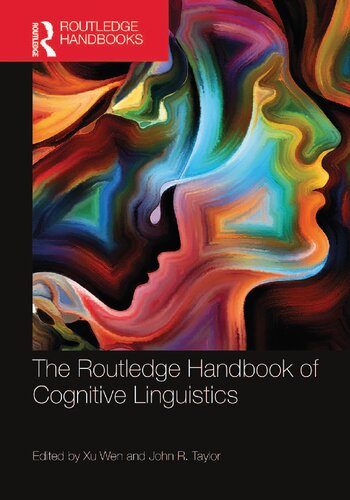

Most ebook files are in PDF format, so you can easily read them using various software such as Foxit Reader or directly on the Google Chrome browser.
Some ebook files are released by publishers in other formats such as .awz, .mobi, .epub, .fb2, etc. You may need to install specific software to read these formats on mobile/PC, such as Calibre.
Please read the tutorial at this link: https://ebookbell.com/faq
We offer FREE conversion to the popular formats you request; however, this may take some time. Therefore, right after payment, please email us, and we will try to provide the service as quickly as possible.
For some exceptional file formats or broken links (if any), please refrain from opening any disputes. Instead, email us first, and we will try to assist within a maximum of 6 hours.
EbookBell Team

5.0
48 reviewsThe Routledge Handbook of Cognitive Linguistics provides a comprehensive introduction and essential reference work to cognitive linguistics. It encompasses a wide range of perspectives and approaches, covering all the key areas of cognitive linguistics and drawing on interdisciplinary and multidisciplinary research in pragmatics, discourse analysis, biolinguistics, ecolinguistics, evolutionary linguistics, neuroscience, language pedagogy, and translation studies.
The forty-three chapters, written by international specialists in the field, cover four major areas:
• Basic theories and hypotheses, including cognitive semantics, cognitive grammar, construction grammar, frame semantics, natural semantic metalanguage, and word grammar;
• Central topics, including embodiment, image schemas, categorization, metaphor and metonymy, construal, iconicity, motivation, constructionalization, intersubjectivity, grounding, multimodality, cognitive pragmatics, cognitive poetics, humor, and linguistic synaesthesia, among others;
• Interfaces between cognitive linguistics and other areas of linguistic study, including cultural linguistics, linguistic typology, figurative language, signed languages, gesture, language acquisition and pedagogy, translation studies, and digital lexicography;
• New directions in cognitive linguistics, demonstrating the relevance of the approach to social, diachronic, neuroscientific, biological, ecological, multimodal, and quantitative studies.
The Routledge Handbook of Cognitive Linguistics is an indispensable resource for undergraduate and postgraduate students, and for all researchers working in this area.